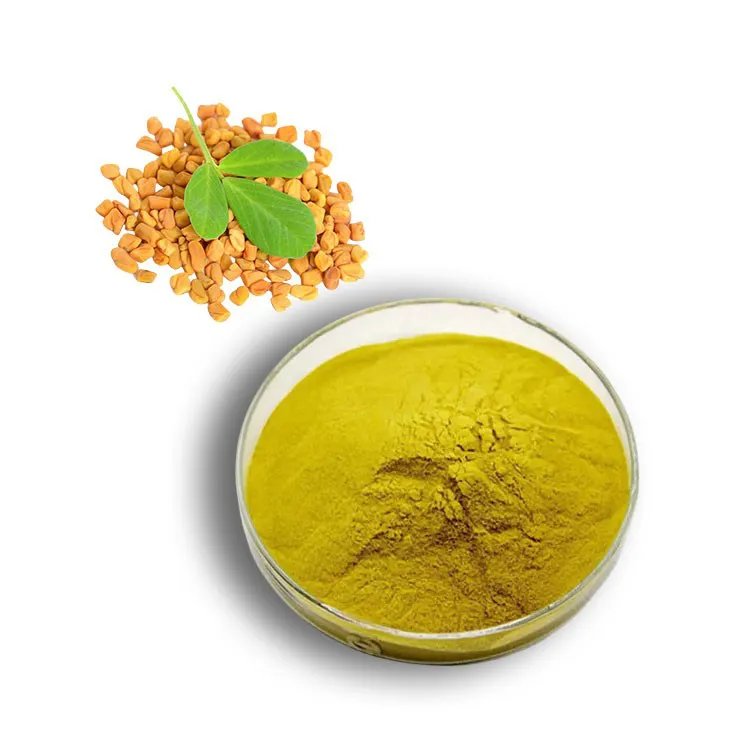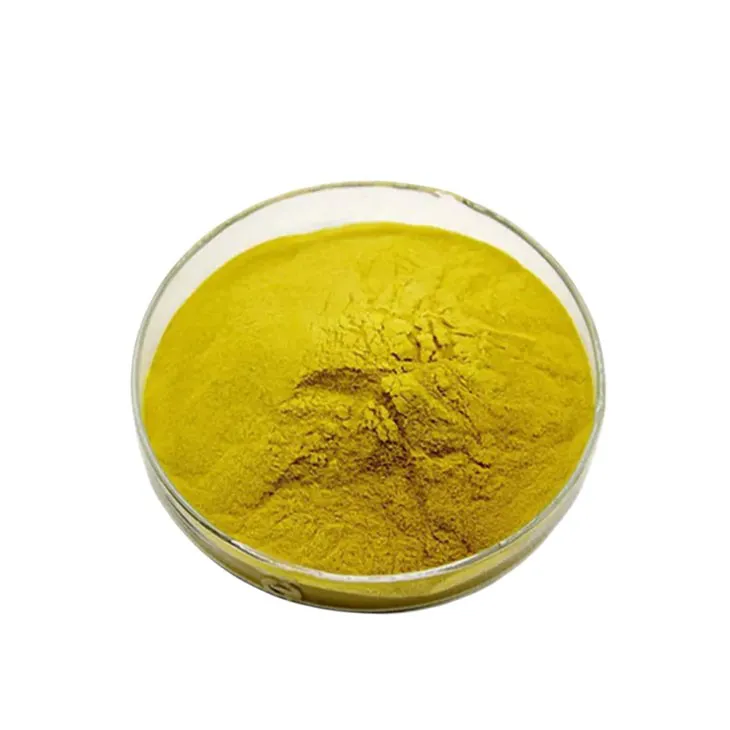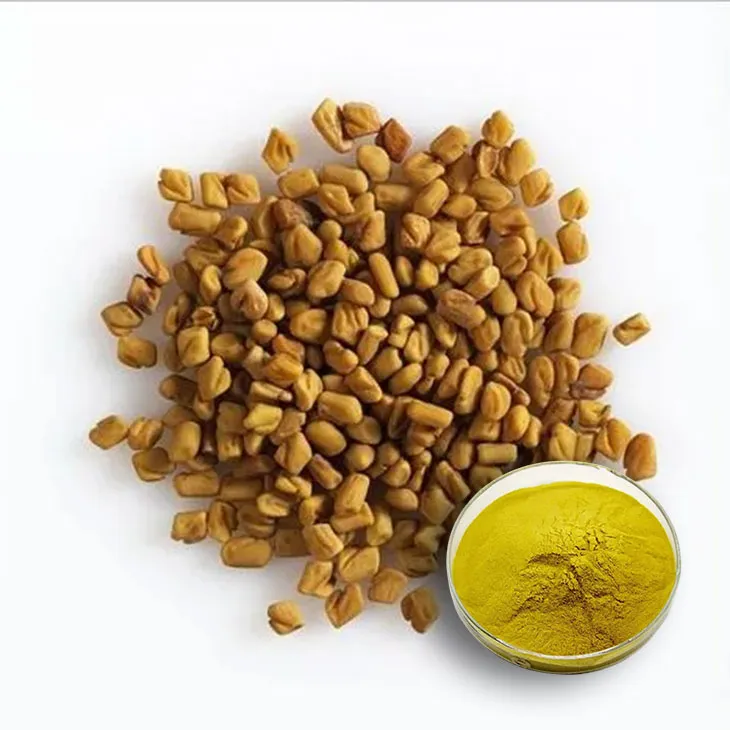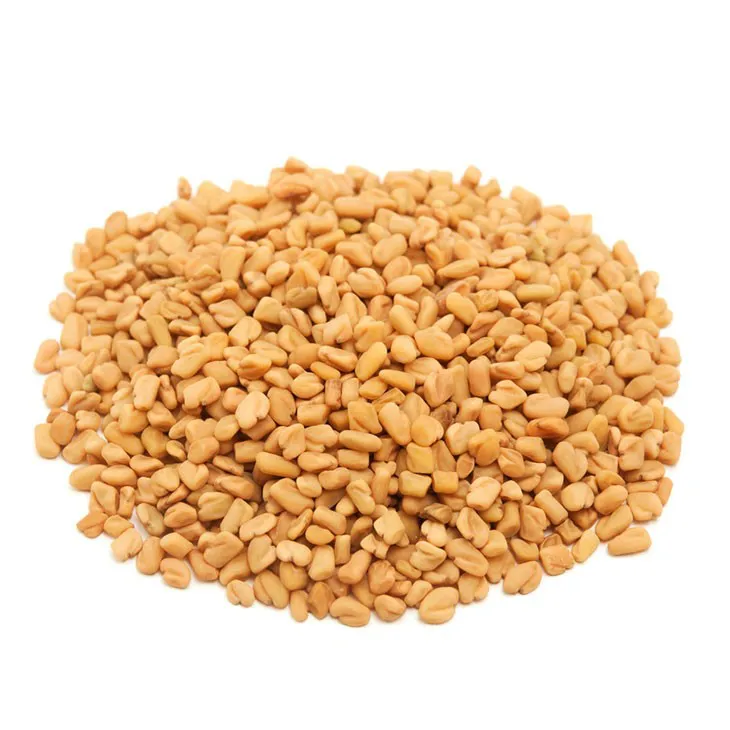- 0086-571-85302990
- sales@greenskybio.com
The Best Source of Natural Fenugreek Extract Powder.
2024-11-30

Introduction
Fenugreek (Trigonella foenum - graecum) has a long - standing history in traditional medicine across various cultures. The plant's seeds, which are the main source for Fenugreek Extract Powder, are rich in a variety of bioactive compounds. As the demand for natural health products increases, Fenugreek Extract Powder has gained significant popularity. However, not all sources are created equal. Understanding the best natural sources is crucial for ensuring the quality, potency, and safety of the final product.

Wild - Harvested Fenugreek
Advantages
- Genetic Diversity: Wild - harvested fenugreek often has a greater genetic diversity compared to cultivated varieties. This can potentially lead to a wider range of bioactive compounds in the extract powder. For example, in some wild populations, unique chemical profiles may be present due to adaptation to different environmental conditions.
- Natural Adaptation: These plants have adapted to their native habitats without human interference. They may have developed stronger resistance to local pests and diseases, which could translate to a more resilient and potentially more potent extract. In some regions, wild fenugreek has been found to have higher levels of certain flavonoids compared to cultivated types.
Disadvantages
- Sustainability Concerns: Over - harvesting wild fenugreek can pose a significant threat to its natural populations. In some areas, unregulated collection has led to a decline in the plant's abundance. This not only affects the plant itself but also the entire ecosystem it is a part of. For instance, in certain regions where fenugreek is a key part of the native flora, over - harvesting can disrupt the food chain for local wildlife.
- Quality Variability: The quality of wild - harvested fenugreek can vary greatly depending on the location, season, and harvesting methods. There may be a lack of standardization in harvesting, which can lead to inconsistent levels of active ingredients in the extract powder. For example, different soil conditions in various wild - harvesting areas can result in different nutrient uptake by the plants, thereby affecting the final composition of the extract.
- Contamination Risk: Since wild - harvested fenugreek grows in uncontrolled environments, there is a higher risk of contamination. This can include exposure to pollutants such as heavy metals from nearby industrial areas or pesticides from adjacent agricultural fields. Such contaminants can be transferred to the extract powder and pose a risk to human health.

Cultivated Fenugreek
Advantages
- Quality Control: Cultivated fenugreek allows for better quality control. Farmers can carefully select the best - performing varieties, manage the growth conditions, and ensure proper harvesting techniques. This results in a more consistent product. For example, by controlling the irrigation and fertilization, farmers can optimize the growth of fenugreek plants to produce seeds with a higher content of desired bioactive compounds.
- Sustainability: Cultivation provides a sustainable source of fenugreek. It can be managed in a way that meets the market demand without depleting natural populations. In addition, modern agricultural practices such as crop rotation can be implemented to maintain soil fertility and overall environmental health. For instance, when fenugreek is rotated with other legumes, it can enhance soil nitrogen levels, which is beneficial for both the fenugreek plants and the subsequent crops.
- Enhanced Potency: Through selective breeding, cultivators can develop fenugreek varieties with enhanced levels of specific bioactive compounds. This can lead to a more potent extract powder. For example, some breeding programs aim to increase the content of fenugreek saponins, which are known for their potential health - promoting properties.
Disadvantages
- Genetic Uniformity: Cultivated fenugreek may have a relatively lower genetic diversity compared to wild - harvested ones. This could potentially make them more vulnerable to certain pests and diseases in the long run. If a new pathogen emerges that is specifically adapted to attack the commonly cultivated fenugreek varieties, it could lead to significant crop losses.
- Cost: The cost of cultivation, including factors such as land, labor, and inputs like fertilizers and pesticides, can be relatively high. This can translate to a higher price for Fenugreek Extract Powder sourced from cultivated plants. In some cases, small - scale farmers may struggle to compete with larger producers due to the high costs associated with meeting quality and regulatory requirements.

Geographical Sources
Mediterranean Region
- Ideal Climate: The Mediterranean climate, with its warm, dry summers and mild, wet winters, is well - suited for fenugreek cultivation. This climate promotes the growth of fenugreek plants and can influence the composition of the seeds. For example, the extended sunlight hours during the summer can enhance the production of certain secondary metabolites in the fenugreek seeds.
- Traditional Knowledge: The Mediterranean region has a long history of using fenugreek in traditional medicine and cuisine. This has led to the development of specific cultivation and harvesting practices that have been passed down through generations. Local farmers are often well - versed in the optimal time to harvest fenugreek to ensure maximum potency of the seeds.
- Quality Reputation: Fenugreek sourced from the Mediterranean region has a reputation for high quality. This is partly due to the favorable growing conditions and the strict agricultural regulations in some countries in the region. For example, in Italy and Greece, there are regulations governing the use of pesticides and fertilizers in fenugreek cultivation, which helps to ensure the safety and quality of the final product.
Indian Subcontinent
- Abundant Cultivation: The Indian subcontinent is one of the largest producers of fenugreek in the world. Fenugreek has been an integral part of Indian traditional medicine (Ayurveda) for centuries. The large - scale cultivation in this region ensures a steady supply of fenugreek seeds for extract powder production. For example, in India, fenugreek is grown in various states, from Rajasthan in the north - west to Tamil Nadu in the south.
- Rich Genetic Resources: Due to the long history of fenugreek cultivation in the Indian subcontinent, there is a rich pool of genetic resources. This includes a wide variety of fenugreek cultivars, each with its own unique characteristics. Some Indian cultivars are known for their high content of specific bioactive compounds, such as fenugreek fibers that are beneficial for digestive health.
- Cost - Effective: The cost of fenugreek production in the Indian subcontinent is relatively low compared to some other regions. This is due to factors such as lower land and labor costs. As a result, fenugreek extract powder sourced from this region can be more competitively priced in the global market.

Organic vs. Conventional Sources
Organic Fenugreek
- No Chemical Residues: Organic fenugreek is grown without the use of synthetic pesticides, fertilizers, or genetically modified organisms (GMOs). This ensures that the extract powder is free from chemical residues that may be present in conventionally grown fenugreek. For example, in organic farming, natural pest control methods such as the use of beneficial insects are employed, reducing the risk of pesticide contamination in the final product.
- Soil Health and Nutrient Profile: Organic cultivation focuses on maintaining soil health through practices like composting and crop rotation. This can result in fenugreek plants that have a more balanced nutrient profile. The improved soil fertility can lead to fenugreek seeds with higher levels of certain micronutrients, which may enhance the quality of the extract powder.
- Market Demand: There is a growing market demand for organic products, including fenugreek extract powder. Consumers are increasingly concerned about the environmental and health impacts of conventional farming methods. Organic fenugreek extract powder can appeal to this segment of the market, potentially commanding a higher price.
Conventional Fenugreek
- Higher Yield Potential: Conventional farming methods often utilize synthetic fertilizers and pesticides, which can sometimes lead to higher yields. In some cases, farmers may be able to produce more fenugreek seeds per unit area compared to organic farming. This can be important for meeting the large - scale demand for fenugreek extract powder in the market.
- Cost - Efficiency: Conventional farming may be more cost - efficient in some situations. The use of synthetic inputs can be less expensive than the labor - intensive and time - consuming practices required in organic farming. For small - scale farmers with limited resources, conventional farming methods may be a more viable option to produce fenugreek for extract powder.
- Regulatory Standards: Although there are regulations governing the use of pesticides and fertilizers in conventional farming, the standards may be different from those in organic farming. However, as long as farmers adhere to the regulatory limits, the fenugreek produced can still be considered safe for consumption. For example, in many countries, there are maximum residue limits (MRLs) set for pesticides in food products, including fenugreek.
Conclusion
When considering the best source of natural fenugreek extract powder, multiple factors need to be taken into account. While wild - harvested fenugreek offers certain advantages in terms of genetic diversity, it also comes with significant sustainability and quality control challenges. Cultivated fenugreek, on the other hand, provides a more sustainable and consistent source, although it may have some drawbacks such as genetic uniformity and higher cost. Geographical sources such as the Mediterranean region and the Indian subcontinent each have their own unique characteristics that can influence the quality of the fenugreek. Additionally, the choice between organic and conventional sources depends on factors such as market demand, cost, and consumer preferences. In conclusion, a comprehensive understanding of these factors is essential for producers and consumers alike to ensure the production and use of high - quality, safe, and effective fenugreek extract powder.
FAQ:
What are the main regions where fenugreek is cultivated?
Fenugreek is cultivated in various regions around the world. Some of the main areas include the Mediterranean region, parts of Asia such as India and Pakistan, and also in some African countries. In India, for example, fenugreek has been a traditional crop for a long time. The climate in these regions, which often features warm and dry conditions, is suitable for fenugreek cultivation.
How does wild - harvested fenugreek differ from cultivated fenugreek in terms of quality?
Wild - harvested fenugreek may have some differences in quality compared to cultivated fenugreek. Wild - harvested fenugreek can be more variable in its chemical composition as it grows in a less controlled environment. It might be exposed to different soil conditions, sunlight, and levels of competition from other plants. Cultivated fenugreek, on the other hand, can be carefully managed. Farmers can control factors such as the use of fertilizers, irrigation, and pest control, which may lead to a more consistent quality in terms of the active compounds present. However, wild - harvested fenugreek may sometimes have a unique flavor profile or potentially different levels of certain compounds that could be of interest in some applications.
What are the key factors affecting the potency of fenugreek extract powder?
The potency of fenugreek extract powder can be affected by several factors. Firstly, the variety of fenugreek used is important. Different varieties may have different levels of the active compounds such as fenugreek saponins. Secondly, the growing conditions play a role. Adequate sunlight, water, and soil nutrients can influence the production of these active compounds within the fenugreek plant. Also, the extraction process itself is crucial. The method used to extract the powder from the fenugreek seeds or other parts of the plant can determine how much of the active compounds are actually obtained in the final extract powder.
How can one ensure the safety of fenugreek extract powder?
To ensure the safety of fenugreek extract powder, several steps can be taken. Firstly, it should be sourced from reliable suppliers who follow good agricultural and manufacturing practices. These suppliers should ensure that the fenugreek is grown without excessive use of harmful pesticides or chemicals. Secondly, proper testing should be carried out. This includes testing for contaminants such as heavy metals, pesticides residues, and microbial contamination. Thirdly, when using fenugreek extract powder, it should be used according to recommended dosages. High doses of fenugreek may cause some side effects in certain individuals, so following the appropriate usage guidelines is essential for safety.
What are the traditional uses of fenugreek that may be related to the quality of its extract powder?
Fenugreek has been used traditionally for various purposes such as for digestive health and as a galactagogue (to increase milk production in breastfeeding women). These traditional uses may be related to the quality of its extract powder. For example, the compounds in fenugreek that are beneficial for digestion may be the same ones that are carefully extracted and concentrated in the extract powder. If the fenugreek used to make the extract powder is of high quality, it may be more effective for these traditional uses. The traditional uses also give an indication of the types of compounds that should be present in the extract powder for it to be considered of good quality.
Related literature
- The Cultivation and Medicinal Properties of Fenugreek"
- "Fenugreek: Unraveling the Quality and Potency of its Extracts"
- "Safety Considerations in Fenugreek Extract Powder Production"
- ▶ Hesperidin
- ▶ citrus bioflavonoids
- ▶ plant extract
- ▶ lycopene
- ▶ Diosmin
- ▶ Grape seed extract
- ▶ Sea buckthorn Juice Powder
- ▶ Beetroot powder
- ▶ Hops Extract
- ▶ Artichoke Extract
- ▶ Reishi mushroom extract
- ▶ Astaxanthin
- ▶ Green Tea Extract
- ▶ Curcumin Extract
- ▶ Horse Chestnut Extract
- ▶ Other Problems
- ▶ Boswellia Serrata Extract
- ▶ Resveratrol Extract
- ▶ Marigold Extract
- ▶ Grape Leaf Extract
- ▶ blog3
- ▶ blog4
-
Optimal Bioavailability of Marigold Extract.
2024-11-30
-
Ganoderma lucidum extract manufacturer.
2024-11-30
-
Bayberry extract with the highest praise.
2024-11-30
-
Nature's Bounty Ginger Extract.
2024-11-30
-
Ginseng root extract manufacturers.
2024-11-30
-
Organic Olive Leaf Extract, Australia.
2024-11-30
-
Rosemary extract
2024-11-30
-
Curcumin
2024-11-30
-
Lily extract
2024-11-30
-
Uridine-5'-monophosphate Disodium salt
2024-11-30
-
Longan Extract
2024-11-30
-
Sea buckthorn Juice Powder
2024-11-30
-
Eyebright Extract
2024-11-30
-
Epimedium extract powder
2024-11-30
-
Saponin Extract
2024-11-30
-
Tormentil Extract
2024-11-30





















